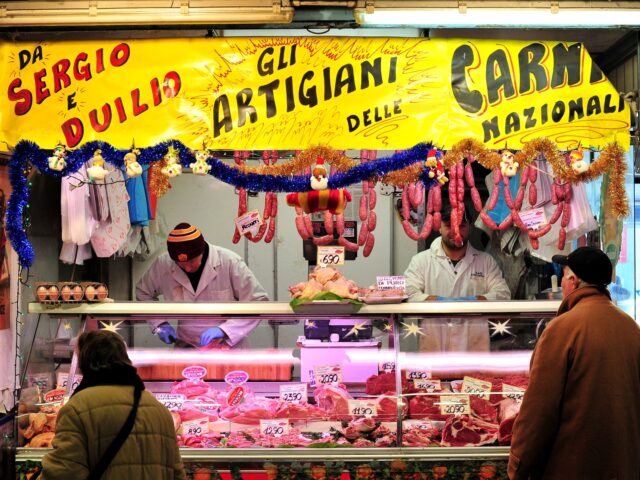The government of Prime Minister Giorgia Meloni has backed legislation that would ban lab-made meat and other synthetic foods in Italy, in a bid to preserve the nation’s internationally acclaimed cuisine.
Following a petition that received over 500,000 signatures, the populist coalition government of Giorgia Meloni has expressed its strong support for the nation’s farmers, the traditional Mediterranean diet of Italy, and to plant the flag firmly against the Great Reset-drive to replace real meat with synthetic proteins grown in laboratories.
Explaining the decision of the government to back the ban on synthetic foods, Agriculture Minister Francesco Lollobrigida said per the Il Messaggero newspaper: “They are poor quality foods. We protect health and the environment.”
“If this phenomenon were to succeed in imposing itself on the markets, it would produce more unemployment, there would be social injustice,” adding that the legislation will put “Italy at the forefront” of the movement against fake foods.
Meanwhile, Minister of Health Orazio Schillaci said: “We are based on the principle of prevention and preserve the agri-food heritage of our nation. We are for the Mediterranean diet.”
The move came after the agricultural firm Coldiretti collected over 500,000 signatures against the proliferation of synthetic meat. Should the legislation be implemented, those who violate the law would be liable to face fines of up to €60,000 (£53,000).
Following the announcement of the government’s decision to support the bill, a “flash mob” of supporters gathered outside the Chigi Palace in Rome, the 16th century building which has become the official residence of the Prime Minister of Italy.
Surprisingly, Prime Minister Meloni left her office to come out and speak before the crowd, saying: “We could only celebrate with our farmers and the president of Coldiretti a measure that puts Italy at the forefront, also on the subject of consumer protection.”
“We are linked to the fact that every citizen who eats here, who eats in the homeland of excellence, can have the same opportunities to consume food of which he knows exactly where he comes from,” she added.
There have been previous attempts to push back against the fake meat industry, including an effort led by French socialist MEP Éric Andrieu in 2019 to force producers of fake meat items such as veggie burgers to drop their meat-sounding titles, and use proposed alternatives such as “veggie discs”. However, in 2020, Brussels shut down the proposal, arguing that a shift towards a more plant-based diet falls in line with the EU’s green agenda.
The anti-meat push has picked up steam in recent years, with globalist figures and institutions such as the World Economic Forum throwing their weight behind the leftist idea. Earlier this year, for example, at the annual WEF summit in Davos, the chairman of German manufacturing giant Siemens, Jim Hagemann Snabe called for a dramatic global reduction in meat consumption to mitigate the alleged impact of humans on the environment.
“If a billion people stop eating meat, I tell you, it has a big impact. Not only does it have a big impact on the current food system, but it will also inspire innovation of food systems,” the Siemens boss claimed, adding: “I predict we will have proteins not coming from meat in the future, they will probably taste even better.”
The Klaus Schwab-founded globalist institution has been at the forefront of the anti-meat movement, advocating for the adoption of supposedly more “climate beneficial foods” like as algae, cacti, seaweed and the normalisation of bug-based protein sources.
The globalist institution has also promulgated the notion of switching to an insect protein-based diet to supposedly become more sustainable.
Follow Kurt Zindulka on Twitter here @KurtZindulka

COMMENTS
Please let us know if you're having issues with commenting.